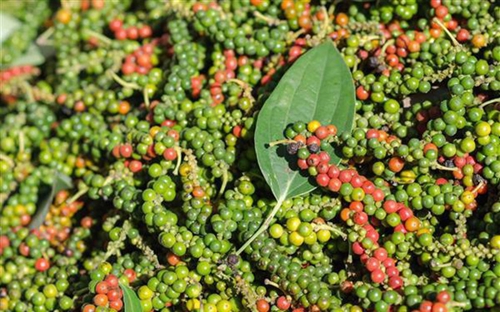The demand for pepper-consuming countries has not yet shown signs of strong growth.
Vietnam this year expects to have bumper harvests from the many pepper plantations created in 2017.
The domestic market still has a significant stock of pepper from the previous crop, with many households and businesses stockpiling to wait for higher prices, the Vietnam Pepper Association said.
On the world market, pepper output is likely to increase from some major producing countries. In India, the pepper output this year is expected to reach about 61,000-62,000 tons, up by 30 percent year on year.
    |
 |
|
In the early days of January, pepper price was at 39,000-42,000 VND per kilo. Photo: vietnamhoinhap.vn |
According to the association, Brazil has a production model at very low cost and high yield. Those factors help Brazilian pepper’s competitiveness on the global market.
With the sharp increase of pepper planting acreage in many countries in the 2016-17 period, the global pepper market is forecast to maintain supply until at least the end of 2020, the association said.
Therefore, domestic pepper experts believe this year pepper prices are likely to continue falling.
The pepper price is likely to continue to drop to about 36,000-38,000 VND per kilo, and possibly 35,000 VND.
In the early days of January, the price was at 39,000-42,000 VND per kilo.
However, the pepper price would not plunge further because with prices at around 37,000 VND, speculators will purchase pepper, according to the association.
The domestic pepper price is expected to remain at a low level until the end of this year's crop, it said.
This price is forecast to increase slightly in 2021 and see strong recovery from 2022 when the strong reduction in output at home and abroad will help revive the price on the local and global markets.
The lower future supply is due to farmers shifting to other crops.
Last year was the third consecutive year Vietnam gained a record in pepper export volume. But its pepper export value declined against the previous year due to the plunge in the global price.
In 2019, the average export price of pepper was 2,516 USD per ton, a reduction of 23.6 percent year on year.
According to the Ministry of Agriculture and Rural Development (MARD), Vietnam last year exported 284,000 tons of pepper, earning 715 million USD. The exports rose by 23.4 percent in volume but fell by 5.7 percent in value year on year.
Of which, the US continued to be the largest export market of Vietnamese pepper, accounting for 19.5 percent of the total exports. Following were India, Germany and the Netherlands.
Pepper exports to most markets saw surges in volume but decreases in value. However, Vietnam saw significant growth in pepper exports to Germany in both volume and value.
The nation also gained high growth in pepper exports to some markets including Thailand, Russia and Turkey. The exports surged by 89.4 percent in volume and 46 percent in value to Turkey, 40.6 percent in volume and 10.3 percent in value to Russia, and 34.8 percent in volume and 0.6 percent in value to Thailand.
This year, the free trade agreement between Vietnam and the EU (EVFTA) is expected to create good conditions and opportunities for the domestic pepper industry to promote exports to the EU, especially the German market.
This agreement would also help pepper exporting enterprises expand their export markets and have more chances to attract foreign investment in the processing stage.
Source: VNA